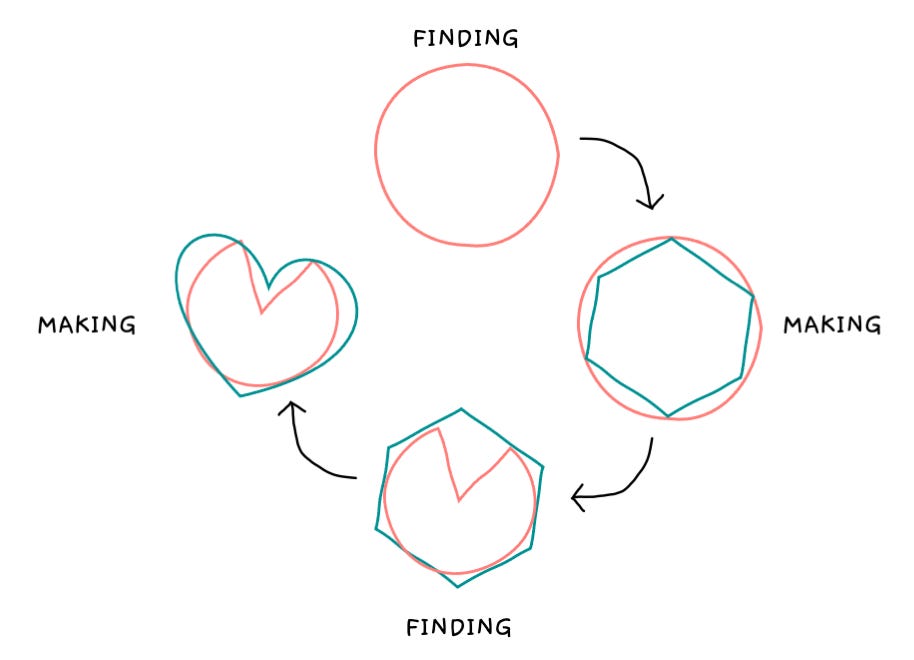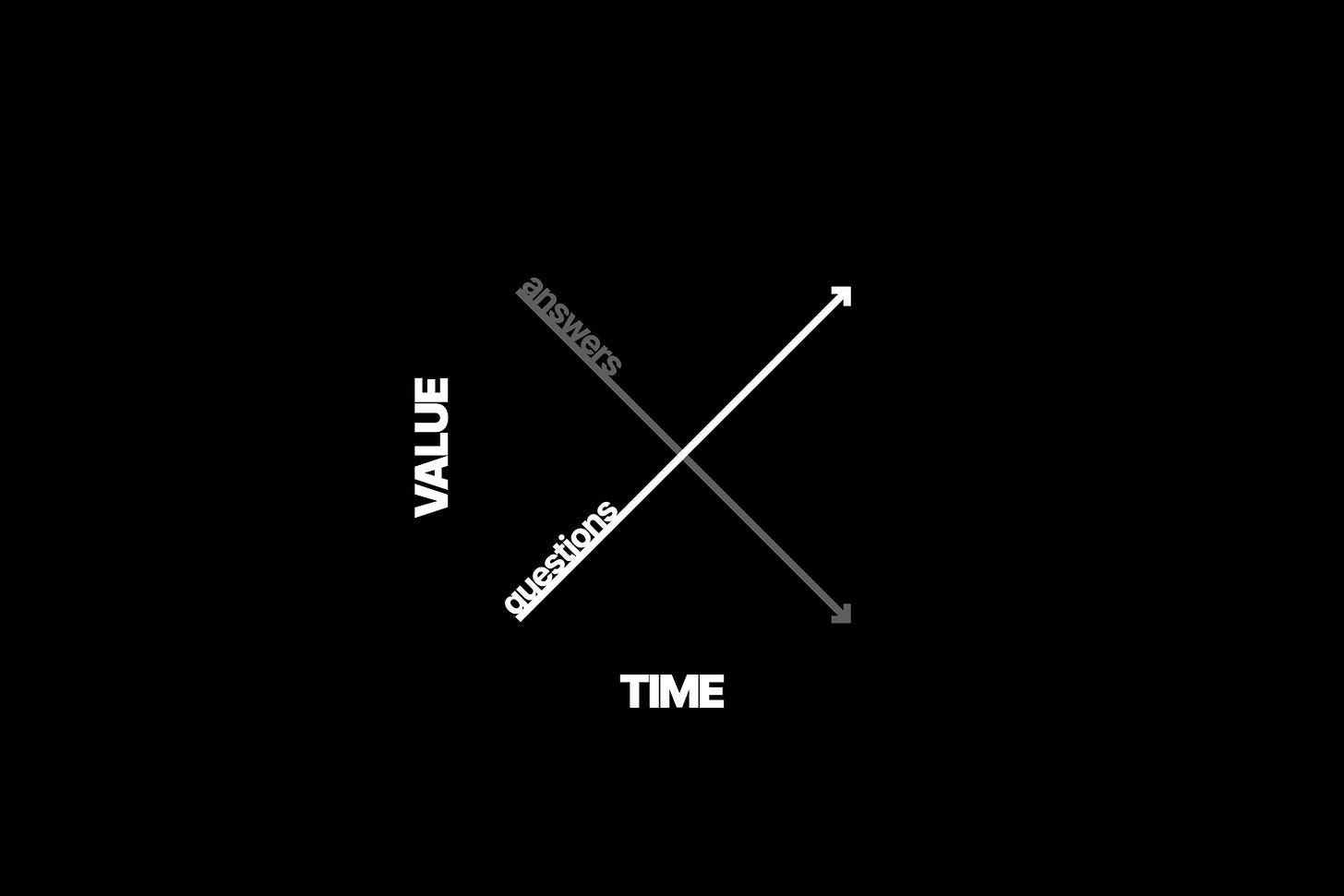Finding and Making
How do we generate ideas?
How do we generate ideas?
I’ve been writing this newsletter for over a year, and people often ask me how I generate ideas. While I can share my thoughts, I thought it’d help to get another writer’s perspective. Josh Chiodo, a fellow writer who explores topics around creativity and learning, was generous enough to share his insights. Without further ado, enjoy this DOUBLE FEATURE response to “How do we generate ideas?”
My Response
I spent the last two weeks in Budapest visiting coworkers. Alongside goulash, bathhouses, and palinka, I enjoyed learning a Hungarian folk saying: A sült galamb nem repül a szájába, or “A roasted pigeon will not fly into one’s mouth.”
A century ago, Hungarians in the countryside ate roasted quail (or pigeons, I guess). The folk wisdom claims that if we wanted to eat a roasted pigeon, we couldn’t wait around for one to find us. We had to hunt the bird, kill it, clean it, and roast it.
The same is true of ideas. We can’t loiter around, our creative mouths slack-jawed, waiting for a business concept or story plot to fly into them. A screenwriter won’t find the spark for a script alone in her apartment. She’ll discover inspiration as she speaks with the guy who runs the corner store, walks through a park she’s never visited, or reads a new book. The world is crawling with ideas, but we must go out and pluck them.
However, the perfect idea might not exist. If we spend all our time searching for the ideal image in our heads, we could end up empty-handed. Because ideas aren’t just found; they’re made.
My favorite Latin phrase is verum ipsum factum: We only know what we make. If we’re learning something new, the act of synthesizing will solidify our understanding better than anything else. We can read about computer science all day, but we'll never truly understand until we put our fingers on a keyboard to code a program.
Likewise, we can’t understand an idea until we try to make something from it. We might discover a great story concept, but until we try writing the story, we won’t know if the idea is usable. That’s because the act of making involves the details—we must reconcile the intricacies and nuances to make something work. Without getting our hands dirty with the idea, it will remain theoretical and out of touch.
As we attempt to make an idea—flesh it out, frame it, get to know its textures—we might have insufficient raw material to bring it to life.
So, we do more finding.
We seek new perspectives to add dimensions or combine new concepts to see what sticks. Generating new ideas is a loop of finding and making.
After enough iterations, the idea takes shape.
This loop can be big or small. In our romantic lives, we seek our idea of a great partner through dating. No matter how perfect a found person may be, we must work to make the partnership effective. We find new dimensions about the person and make our relationship with them different—more fitting—as we process more information.
On a smaller scale, we might find a new quote intriguing. Once we journal about the idea and relate it to our experiences, it will resonate deeper.
If you’re struggling to generate ideas, ask yourself: Do I have a finding problem or a making problem?
Josh’s Response
You've always wanted to try something new. To enter a field or write a book or start a business...but no matter what you do, you get stuck in your ways and never actually do anything.
The idea of starting something new is exhilarating, but when you think about actually beginning, it loses its luster.
Like the “real world,” our heads are full of ideas. Who knows which ones will be good enough to pursue?
An "idea" could be anything. It’s not confined to a single industry or point in time, and you don’t even need to know what you’re talking about—it’s just an idea!
So how do I develop ideas for Deeper Documents (my publication)? And how do I know which ones to take action on?
There are a diversity of sources, but they all funnel into one place. Whether it's a question I'm mulling over, a quote I've read, or a video I've watched—anything that sparks a moment of inspiration gets noted.
Every month or so, I'll review these notes and mark any I feel could be dived into and shared. It really is that straightforward.
Getting to this stage isn’t so straightforward. If someone gave you a list of ideas it would be pretty simple to just scour through and cherry-pick. But we need to create our unique lists. This is an active endeavor. Paying attention to what captures your intrigue. Paying attention to your thoughts. Taking notes about you. Be prepared to write down random ideas at random times. My phone is always with me, so I use that as my catch-all. And if it's not, you can be sure I've got a notebook.
But we aren’t even at the valuable point yet. The true value is revealed later in reflection. You need to let the thoughts simmer and have new ones consume you. So when you look over your notes, objectiveness is present. What you wrote three months earlier takes on a new meaning. And three months after that, another meaning. Your notes change over time as you do.
It's a process, for sure. But it’s deeply satisfying. And I never cease to be surprised by what I can come up with.
Though, what I write about are primarily minor concepts that fit on a virtual page. How about those spectacular concepts? Those which alter the course of history? The Ubers and Facebooks?
What if generating ideas was as easy as this question?
In his book A More Beautiful Question, Warren Berger demonstrates just how to produce these unconventional ideas. Amongst other variations, some of the biggest ideas have boiled down to asking What if?
What if allows you to explore the possibilities. It lifts the limitation. You're not looking for a solution; you're looking for an idea, so you can build on the concept regardless of whether it will work.
Please consider subscribing to Deeper Documents if you enjoyed Josh’s writing and visuals. His posts are written with the same thoughtful quality, and I believe you’d enjoy them.
Now, it’s your turn, reader. How do you generate ideas?





Excellent once again! Definitely great impute. Thank you for sharing this. 👍🥰